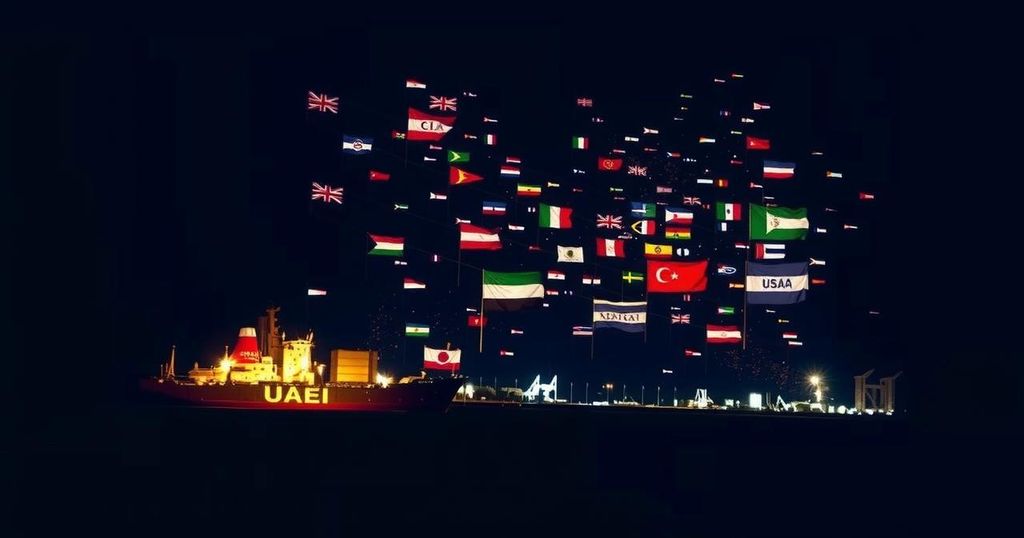Global news
Politics
AFRICA, AGNÈS CALLAMAR, AGNES CALLAMARD, AMNESTY, AMNESTY INTERNATIONAL, ARKANSAS DEMOCRAT, ASSOCIATED PRESS, CONFLICT, DARFUR, DEMOCRAT, EDGE GROUP, EUROPE, FRANCE, GALIX, GOVERNMENT, HUMANITARIAN CRISIS, KNDS, KNDS FRANCE, LACROIX, LACROIX DEFENSE, MILITARY, RAPID SUPPORT FORCES, RSF, SUDAN, SUDANESE ARMED FORCES, THE ASSOCIATED PRESS, U. N, UAE, UNITED NATIONS, WAR CRIMES
Marcus Li
0 Comments
UAE Accused of Violating Arms Embargo in Sudan Civil War
Amnesty International reports that armored vehicles from the UAE, equipped with French defense systems, have been captured by the Sudanese army in the ongoing civil war. This presence may violate a UN arms embargo. With over 20,000 dead and millions displaced, the conflict raises urgent humanitarian and international law concerns. The UAE denies supplying the RSF with weaponry, amidst calls for action from Amnesty International and denials from involved parties.
Armored vehicles manufactured by the United Arab Emirates (UAE) and equipped with French defense systems have been reportedly captured by the Sudanese army amidst the ongoing civil war in Sudan. Amnesty International disclosed in a recent report that these UAE-made armored personnel carriers have been identified across Sudan, particularly in the Darfur region, where they are deployed by the paramilitary Rapid Support Forces (RSF) against the Sudanese Armed Forces. The organization suggests that this presence likely constitutes a violation of a United Nations arms embargo, which prohibits the transfer of weapons to Sudan. The civil war erupted in April 2023 after long-standing tensions between the RSF and the Sudanese army escalated into widespread violence across the country, resulting in severe human rights rights violations. According to United Nations estimates, the conflict has claimed over 20,000 lives and displaced approximately 11.6 million individuals. The UAE has denied claims of supplying the RSF with weapons that have exacerbated the 18-month conflict. Amnesty International’s report purportedly identifies Nimr Ajban armored personnel carriers on the ground through the verification of images shared on social media. These armored vehicles were manufactured by Edge Group in the UAE and are equipped with the Galix reactive defense system, a product of French companies Lacroix Defense and KNDS France. Agnès Callamard, Amnesty International’s Secretary General, stated, “Our research shows that weaponry designed and manufactured in France is in active use on the battlefield in Sudan. The Galix System is being deployed by the RSF in this conflict,” emphasizing its clear violation of international arms regulations. In light of this, she urged the French government to halt the supply of such systems to the UAE. In reaction to the report, Lacroix confirmed through an email communication that it had supplied the Galix systems to the Emirati Armed Forces for their specified use as smoke-screening countermeasures. Conversely, a spokesperson for the Emirati government asserted that the UAE is the target of a coordinated misinformation campaign aimed at discrediting its foreign policy and humanitarian contributions. They reiterated to the U.N. Security Council that they are not providing assistance or supplies to the RSF or any warring entities in Sudan. Furthermore, last month, the United States sanctioned a senior RSF leader for orchestrating weapons supply efforts during the conflict, revealing connections to a UAE-based front company that imported military vehicles into Sudan.
The ongoing civil war in Sudan is rooted in a complex interplay of power struggles, particularly between the Sudanese Armed Forces and the paramilitary group Rapid Support Forces. Following a military coup in 2021, tensions escalated leading to violent conflicts in April 2023. The international community has raised concerns regarding violations of arms embargoes and human rights abuses within the conflict. The involvement of foreign manufacturing, especially in the context of alleged military supplies from the UAE, adds a layer of complexity to the unfolding humanitarian crisis. Amnesty International’s findings reflect growing apprehensions about international complicity in the protraction of this conflict through military support.
In summary, the accusations against the UAE regarding the provision of military vehicles to the Rapid Support Forces in Sudan spotlight critical issues surrounding international arms regulations and humanitarian concerns amidst ongoing violence. The identification of UAE-manufactured armored vehicles with French components active in conflict zones presents significant implications for global geopolitical relations. The responses from both the UAE and involved armament companies indicate the contentious dialogue surrounding the establishment of accountability and adherence to international laws during such humanitarian crises.
Original Source: www.arkansasonline.com




Post Comment